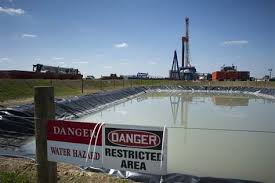A new study has linked fracking to a higher incidence in infant mortality, perinatal mortality, low-weight births, premature births and cancer in infants and children.
Funded by the Pittsburgh Foundation and written by Joe Mangano, co-founder and president of the Radiation and Public Health Project [3], a nonprofit educational and scientific organization that studies the relationship between low-level, nuclear radiation and public health, the study used data from state agencies to examine eight heavily fracked counties in Pennsylvania — four in the northeast and four in the southwest region of the state, counties that account for the majority of the state’s natural gas drill wells and gas production. In all categories but child cancer, increases were greater in the northeast counties than they were in the four southwest counties.
“The information presented in this report supports the hypothesis of a link between exposure to toxic chemicals released in fracking and increased risk of disease and death,” writes Mangano, who also manages the citizen-based radiation monitoring programs near the nuclear plants at Indian Point, New York, and Oyster Creek, New Jersey. “While it is virtually impossible to estimate a ‘dose’ to a community from chemicals generated by fracking, it is clear that residents of the eight most-fracked counties received far greater exposures than those in the rest of Pennsylvania.”
Analyzing publicly available data from the Pennsylvania Department of Health and the U.S. Centers for Disease Control and Prevention, Mangano found that, since the early 2000s and compared to the rest of the state, the heavily-fracked counties have seen a rise in infant mortality (13.9 percent), perinatal mortality (23.6 percent), low-weight births (3.4 percent), premature births/gestation less than 32 weeks (12.4 percent) and cancer incidence in age 0-4 (35.1 percent).
Mangano asserts that the advent of large-scale fracking “has added considerable amounts of toxic chemicals into the environment, including various greenhouse gases and radiation. While potential health consequences of fracking has been become a national issue, very little research on health trends among affected populations has been conducted.”
Over the past decade, Pennsylvania and other parts of the U.S. have seen a rapid rise in fracking operations. Between January 1, 2005, and March 2, 2012, the Pennsylvania Department of Environmental Protection issued 10,232 drilling permits, and denied only 36 requests. [5]
With 66 operators currently drilling 7,788 active wells [6], fracking has dramatically changed the landscape of northeastern and southwestern Pennsylvania. So too has the scientific evidence of fracking’s negative impact on public health [7]. The fracking process produces diesel particulate matter, the exposure of which may lead to asthma, headaches, high blood pressure, anemia, congenital hearth defects, heart attacks and cancer.
Fracking has also been linked to drinking water pollution [8] and the release of radon gas [9], a known carcinogenic. Some 600 chemicals are used in fracking fluid, including known carcinogens and toxins such as lead, benzene, uranium, radium, methanol, mercury, hydrochloric acid, ethylene glycol and formaldehyde.

